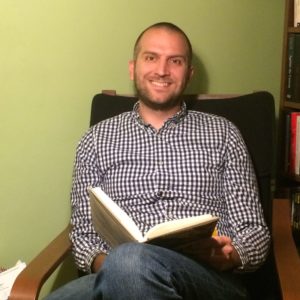In a special weekly series, the College of Liberal Arts is featuring a faculty member from one of our 13 departments. We asked questions about why they are passionate about the subjects they study and teach, and how they found their path to CSU. See all “Faculty Friday” features here.
Peter Erickson
Assistant Professor of German, Department of Languages, Literatures, and Cultures
1. What did you want to be when you were little?
I definitely wanted to be a novelist. While in middle school and high school, I would carry around a wooden clipboard with me and scribble away notes. I believe I wrote hundreds and hundreds of pages. I was constantly editing and re-editing manuscripts.
All the while, I had the vague notion that novelists who couldn’t live off their writing became English professors, so I always had academia in the back of my mind.
By the time I arrived in college, though, I decided that it sounded more fun and challenging to concentrate in a foreign language. I liked that in the German program I could move more easily between disciplines and work on German culture, philosophy, history, and the arts, without needing to choose just one.
2. How did you get to CSU?
Through a miracle. I feel so lucky to be here. Having grown up in California, I’ve always been in love with the West. I try to get up to the mountains as often as I can for hiking, skiing, and trail running.
I was lucky enough to get this job in 2016 after finishing my Ph.D. at the University of Chicago and teaching for two years at a small public university (Oakland University) in Michigan.
3. What is one thing students would be surprised to learn about you?
I’m definitely a live music fan, especially when it comes to bluegrass and indie rock. I make the rounds of outdoor music festivals in Colorado in the summertime. I’m currently dying with happiness because we managed to secure tickets to see Gillian Welch and the Punch Brothers live at the outdoor Red Rocks amphitheater next fall.
4. Why do you research/teach/study German literature? What got you excited about it?
My dissertation was actually about religious conversion narratives in the eighteenth century. I was curious about how people in early modern Europe responded to the rise of evangelical Christianity. How did they think about the place of religion and the public sphere?
And I’ve always been especially curious about how people tell stories of personal change: Are we capable of change? How have people, across history, talked about change? How did they try to bring it about?
Over the years, I’ve spent a lot of time working in dingy, dusty archives and dim libraries across Europe. It’s always been these deeply personal stories of change, of feeling transformed by an experience of nature, or of religion, or of art, that keeps me coming back for more.
5. Which class is your favorite to teach and why?
This is hard! But at the moment I’m teaching a new course –– LGER 251: The Holocaust in Literature and Film –– that I’m really fascinated by. We’re talking a lot about what it means to try to make art about the Holocaust. What are the risks and the potential difficulties in trying to capture genocide through art? Isn’t it, in some sense, always exploitative?